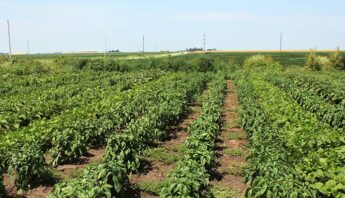For Immediate Release: 1 November 2018
Washington, DC – EPA announced its decision yesterday to continue its registration of Monsanto’s (now merged with Bayer) highly controversial dicamba-based herbicide, Xtendimax, which has damaged millions of acres of farmland over the past two seasons of use.
The announcement provoked outrage and concern from farmers who have seen widespread damage to crops and farm businesses from Monsanto’s product, and who blame EPA for failing to protect them from harm.
Aaron Lehman, President of Iowa Farmers Union, stated, “Clearly this product was in the field way before all the problems with it were solved. For two years, farmers paid the price for EPA’s mistake. Many had crop damage from drift. Others paid extra for seed because they felt they had no choice but to purchase dicamba-resistant seed to protect themselves. But the reality is that the original problems haven’t been fixed.”
In 2017, over three million acres of soybeans were damaged by dicamba drift. In 2018, over one million acres of soybeans were damaged as of mid-July, along with numerous reports of dicamba damage to fruits, vegetables, alfalfa, commercial and residential gardens and thousands of trees. A few states such as Arkansas took protective measures by disallowing dicamba applications between April and October 2018, and in those places, damage was reduced. However, weed scientists from Iowa to Tennessee warn that the severity of the dicamba drift crisis continues to hit specialty crop farmers, conventional soybean and cotton growers, orchardists, gardeners and rural residents the hardest.
In its statement, EPA indicated it would add several more label restrictions, such as prohibiting early morning or evening applications and spraying 45 days after soybean planting and 60 days after cotton planting. But farmers say that won’t go far enough to protect vulnerable crops from harm.
Denise O’Brien, Iowa farmer and Board Chair, Pesticide Action Network, stated, “Monsanto (Bayer) has always been determined to keep farmers running on the pesticide treadmill. The reality is we can’t afford another year of Xtend crops. Dicamba drift is dividing neighbors and threatening the survival of farms across the country. We need more than a few extra hours of protection per day. We need a bold and comprehensive policy solution to this drift pandemic.”
Marcia Ishii-Eiteman, Senior Scientist at Pesticide Action Network, stated, “By continuing to protect Monsanto’s (Bayer) profits, EPA has abandoned American farmers and rural residents who have already suffered two years of devastation from dicamba drift. A few more piecemeal label restrictions won’t end this crisis. As farmers and scientists have been saying for years, dicamba simply cannot be kept on fields: it volatilizes, drifts and will continue to cause harm until EPA has the sense and integrity to pull this product from the market.”
Pesticide Action Network and National Family Farm Coalition are co-plaintiffs, along with others, in a lawsuit led by EarthJustice and Center for Food Safety, challenging EPA’s 2016 decision to register Xtendimax.
Contact: Linda Wells, 563-940-1242







